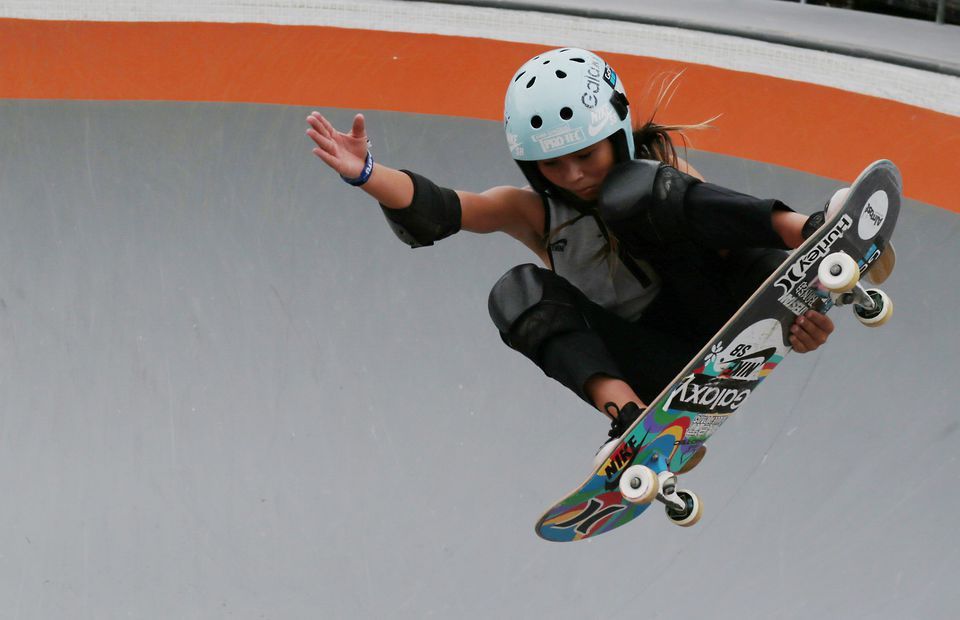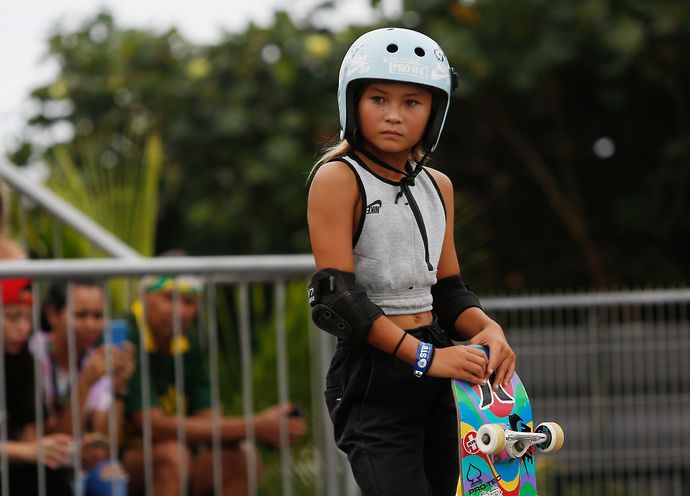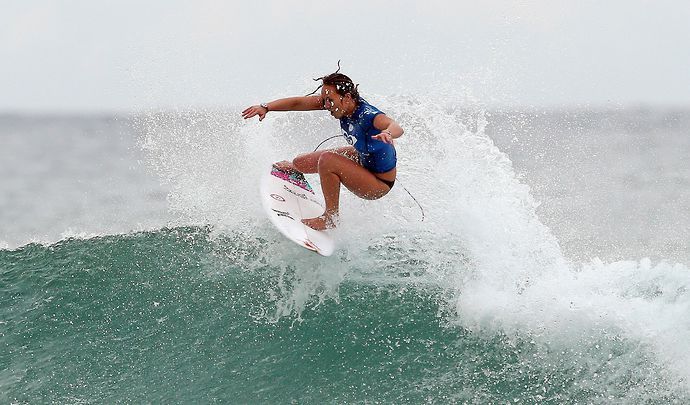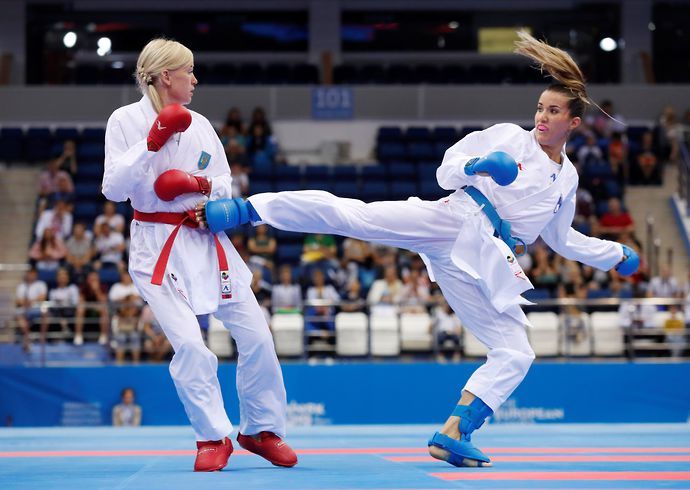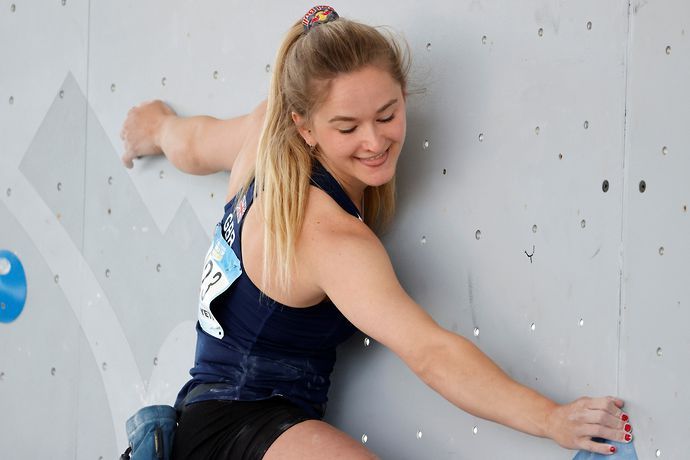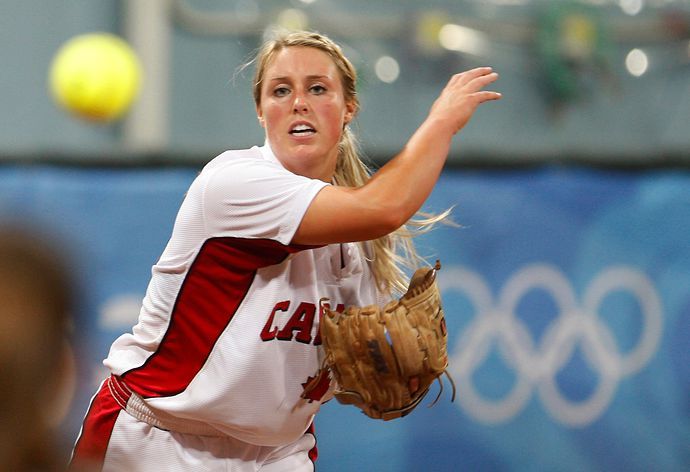With the Tokyo Olympic and Paralympic Games fast approaching this summer, there are six new sports making their debuts.Skateboarding, surfing, speed climbing and karate will feature for the first time at the Olympics, with softball returning after a 13-year absence. Meanwhile, badminton and taekwondo are the newest additions to the Paralympics.GiveMeSport Women takes a look at all of the debutants, plus softball, to see what each sport has to offer. We also run through which athletes you should be keeping an eye on.
Skateboarding
For the first time in Olympic history skateboarding has been introduced, which could bring a whole new audience to the Games. Along with fellow debut sports surfing and BMX cycling, the Summer Olympics have been making moves to include less-traditional, urban sports. Break dancing is set to be included at Los Angeles 2024, for example.
Skateboarding will have two disciplines on show at the Ariake Urban Sports Park in Tokyo.
Street is based on your normal street with obstacles mimicking everyday objects like curbs, railings and benches. There is a time-limit but the skaters have the freedom to decide their route around the course.
Park is synonymous with a traditional skate park – a steep-sided bowl-like course where jumps and mid-air tricks are commonplace.
Great Britain’s skateboarding hopes lie in 12-year-old Sky Brown. She specialises in the park event and could become Team GB’s youngest ever Summer Olympian. The British-Japanese youngster recently returned to action after recovering from life-threatening injuries, earning herself a silver medal on the Dew Tour in Iowa earlier this week.
In street, Brazillian Leticia Bufoni will be the favorite to win in Tokyo and add another gold medal to her collection. She is already a five-time Street champion at the X Games, with her most recent victory coming in 2019.
Bufoni will face competition from her compatriot, the 13-year-old Rayssa Leal, along with Aori Nishimura, who became the first Japanese athlete to win gold at the X Games in 2017. She will hope to replicate her success in her home city.
Surfing
Surfing is one of the few sports which celebrates gender equality. The World Surf League (WSL) announced in 2019 that male and female would receive equal prize money at every WSL event. It is fantastic then, that the sport will be given a bigger spotlight than ever, taking to the sands of Tsurigasaki Beach in July.
So how will it work at the Olympics?
The initial rounds are made up of four or five person heats, followed by the main rounds which consist of two person heats where the winner advances to the next round.
Surfing, like many other Olympic sports, is viewed as a subjective sport with judges deciding which surfer has performed best. A panel of five will judge the performances based on degree of difficulty, the variety and combination of maneuvers, along with speed, power and flow.
The United States of America and Australia have long been known as the leaders in women’s surfing, with Brazillian prospects also popping up from time to time.
Hawaiian native, Carissa Moore, will represent the US at the Games and currently sits on top of this year’s Women’s World Surf League (WSL) Championship tour, making her the one to beat. But a seven-time world champion stands in her way. Australia’s Stephanie Gilmore is the tour’s most successful female surfer and a gold medal at Tokyo would be the perfect addition to her trophy cabinet.
Shino Matsuda is the host nation’s most promising surfing talent. She is currently the youngest female surfer to qualify for the Olympics, at just 18 years of age.
There will be one last shot for qualification at the World Surfing Games starting on May 29th.
Karate
Karate is perhaps the most fitting debut sport story. The martial art’s exact origins are unknown but the sport became systemised in the Japanese prefecture of Okinawa.
There have been several attempts for karate to be included at the Games before, but each bid had been rejected until Tokyo 2020 came along. So what will karate bring to the Olympics?
Karate will have two events - kata and kumite.
Kata focuses on forms with the athlete – the karateka – performing offensive and defensive movements targeting a virtual opponent. They are judged on the correctness and power of their techniques.
Kumite is divided into weight categories and includes two karateka facing each other with the purpose of landing blows to their opponent. Points are awarded depending on where you hit your opponent and what body part you use.
The Olympic karate qualification tournament, starting on June 11th, is the last chance to book a place at the Games. The British Karate Federation is sending four female athletes with the hope of moving up the Olympic standings and securing some British representation for karate’s Olympic debut.
Sport Climbing
Sport climbing has also been added to the list of sports making its debut in Tokyo, and it is a great chance for the sport to showcase itself to the world.
The speed discipline is perhaps the most simple concept of climbing. Two climbers are given identical routes on a 15m-high wall set at a 95 degree angle. The fastest to the top wins. The world record was set by Russian athlete, Yulia Kaplina, in November 2020 when she scaled the wall in a staggering 6.964 seconds.
In bouldering, athletes attempt to climb as many fixed routes as they can within four minutes. This discipline is less about speed and more about the precise planning of a route. There are no safety ropes for the 4m high wall and climbers can restart a route if they fall.
The lead event involves climbers attempting to get as high as they can on a wall which measures more than 15m, with a six-minute time limit in place. If two or more athletes reach the top of the wall, the climber with the fastest time wins.
Shauna Coxsey is the only British athlete, male or female, to have qualified for the Games. She picked up a bronze medal at the 2019 World Championships to qualify for Tokyo, placing behind Janja Garnbret of Slovenia and Japanese climber Akiyo Noguchi in the bouldering and combined events.
She recently spoke with GiveMeSport Women about her Olympic preparations.
Softball
Softball is not making its debut at the Olympics but it is returning, along with baseball, from a 13 year hiatus. Both sports last made an appearance at Beijing 2008.
Softball at the Olympics is played solely by women, whilst baseball is the equivalent for male teams. The two sports share a similar set of rules, however, softball is played on a slightly smaller pitch and with a bigger ball. Players must also use an underarm throw.
The hosts are the defending champions and will be pleased to see the sport’s return to the Games, whilst the United States will be hoping to add a fourth gold softball medal to their tally, after winning in 1996, 2000 and 2004. Australia are three times bronze medallists and will be seen as underdogs in the race for gold.
Para-badminton
The Paralympics have also made way for two new sports. There will be six female Para-badminton events with five singles classifications and one doubles competition, with a mixed doubles event also included.
Japan’s Sarina Satomi is the current world champion in the singles WH1 classification, whilst China dominates the WH2 event with three medallists at the 2019 World Championships.
There will be disappointment for British athletes Rachel Choong and Rebecca Bedford, who compete in the singles SS6 event which is included at Tokyo 2020 for male athletes but not female athletes. Choong earned herself a silver medal at the last World Championships whilst Bedford finished in the bronze medal position.
Para-taekwondo
Taekwondo will also make its debut at the Games this August in the Mukuhari Messe venue. K43 and K44 athletes will compete together in one class, across three different weight categories.
Great Britain have traditionally been successful in taekwondo with Jade Jones, Sarah Stevenson and Bianca Walkden all picking up Olympic medals. Beth Munro and Amy Truesdale will hope to add to this success and be the first to win a taekwondo gold medal at the Paralympics.
Munro will feature in the -58kg event, and Truesdale will be the favourite in the +58kg category as the highest ranked athlete in the world within that division.



















